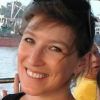 It started with a trip to Bethlehem, and has come to this: gift-laden, work-weary travellers clogging flight paths and highways like swirling snowflakes in a Christmas globe. But I stay home, draw my memories around me like a warm shawl, and embark on a beautiful journey: the one that takes me into the past.
It started with a trip to Bethlehem, and has come to this: gift-laden, work-weary travellers clogging flight paths and highways like swirling snowflakes in a Christmas globe. But I stay home, draw my memories around me like a warm shawl, and embark on a beautiful journey: the one that takes me into the past.
It is Christmas 1973, in an empty boarding school dormitory in Cape Town, South Africa, where my four siblings and I have the pick of any number of beds on which to sleep. We are guests of the school's headmaster and his wife, old family friends.
The dormitory is an improvement on our traditional holidays during which we camp in far less salubrious places like Ponta Zavora in Mozambique where our mother washes towelling nappies by hand and pumps water from a well, and our father kills poisonous snakes as they slither down from trees onto our breakfast table.
In Cape Town we drink tea from blue Tupperware cups, and the creamy taste of long life milk lingers on the tongue like a rare treat. Our parents fashion a triangular tree from an unused mattress, and on Christmas morning we peer over the top of the structure to discover gifts nestled inside it.
I am only five years old, but I climb to the top of Table Mountain with my older brother and sister and father. On the way we encounter a group of Cape Coloureds who are catching frogs so that they can eat their legs. We drink icy water from a stream illuminated with bright green moss, and although my father assures us the water is safe to drink, I feel distinctly adventurous and grown-up doing so.
The trek is arduous, and we are in turn threatened with the prospect that we will miss the last cable car down the mountain, and cajoled with the promise of a Coke float at the elusive summit. The Coke float, a new experience in itself, turns out to be a fool's reward, and the refreshment is reviled in our household forever more.
My father takes us shopping in the city for roller skates; they are like metal sandals on wheels, and their size can be adjusted to fit the wearer. We think we are the bees' knees. We swim at a beautiful spot and christen it 'Appletiser' Lake, because its yellow-umber water reminds us of a drink of that name.
Back at the boarding school we run across immense, emerald sports fields where the freedom feels dangerous and where we discover a plover's nest full of brown speckled eggs.
The Christmas holidays wind lazily to a close; my mother flies home to Johannesburg with my two little sisters while the rest of us journey north-eastwards in our white Chevrolet. At dusk, we pull up onto the Old Johannesburg Road near Kimberley, a dead-end alongside a railroad. My sister and I sleep in the car, my father and brother on blue-and-white striped canvas liloes beneath the stars.
In the morning we discover a tap in the middle of the veld where we clean our teeth. A train hurtles past, its blue-capped driver waving gaily as he blasts his horn.
Decades later, I take my own children to that old road in the Klein Karoo, but only I can see the ghosts. And my brother hikes up Table Mountain with his wife, retracing a different set of invisible childhood steps. It's important to have an interesting childhood, he says, and he's right: for when you grow up you may travel there as often as you like.
 Catherine Marshall is a journalist working for Jesuit Communications.
Catherine Marshall is a journalist working for Jesuit Communications.